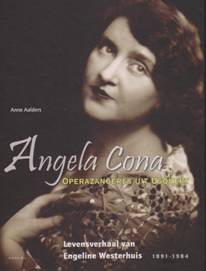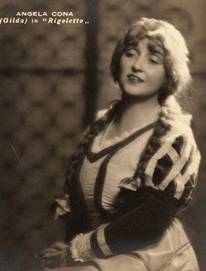OPERAZANGERES UIT USQUERT (in Dutch)
By Anne Aalders
Bedum, 2010, pp 110
www.profiel.nl
info@profiel.nl


ANGELA CONA
OPERAZANGERES UIT USQUERT (in Dutch)
By Anne Aalders
Bedum, 2010, pp 110
www.profiel.nl
info@profiel.nl


This is the biography of Engeline Westerhuis (1891-1984), the youngest daughter of a very rich gentleman-farmer in north-Groningen, a province of the Netherlands. A remarkable story too of a farmer’s daughter choosing for an artistic career and breaking the laws of the farmers’ social rank. It wasn’t obvious for a girl –raised religious -coming from the 19th century countryside to chose for a career as a concert and opera singer. Anne Aalders -the author- was a primary school teacher and later a comprehensive school principal and did a fine job in recreating Westershuis’s life story by using the singer’s own archive. Singers’ biographies are in most cases ‘they made it’ stories, this one is a ‘she didn’t make it’ story’ and in a way as interesting. A singer who worked so hard to achieve fame and recognition as a singer but ended up spending more than earning. Tragic? Not at all. Westerhuis contrary to so many others could fall back on her parents’ wealth and didn’t end up in poverty. Nevertheless the pain of the missed dream syndrome remained with her for the rest of her life. Initial studies were with legends such as Claire Croiza (in Paris) and Gemma Bellincioni who became a good friend. Bellincioni had ended up in the Netherlands because of political consequences of the Great War and when the diva moved back to Milan Westerhuis followed her thus spending several years in Italy and appearing in mainly regional theatres or travelling opera companies. She was sympathetic to Italian fascism –just as Bellincioni was- as Italian fascism was sympathetic to her. In 1936 she returned to her home country and the dream was over. Angelina Cona again became Engeline Westerhuis and now she would lead a farm business combining it with a career as a singing teacher almost until her death in 1984 . She never married. Her story is well written by the author though on occasion the high school teacher way of telling things ends up in the narrative. Costs weren’t spared with excellent printing paper, a beautiful hard cover and several high quality photo productions. Mistakes are really minor ones –Lauri-Volpi becomes Laura Volpi is one of the more painful errors -which speaks for the author’s zest in research especially if you take into consideration that ‘operanostalgia’ is not his cup of tea.
Oh yes, apparently Westerhuis aka Cona did make a record but up until now I couldn’t find any trace of that.
RvdB